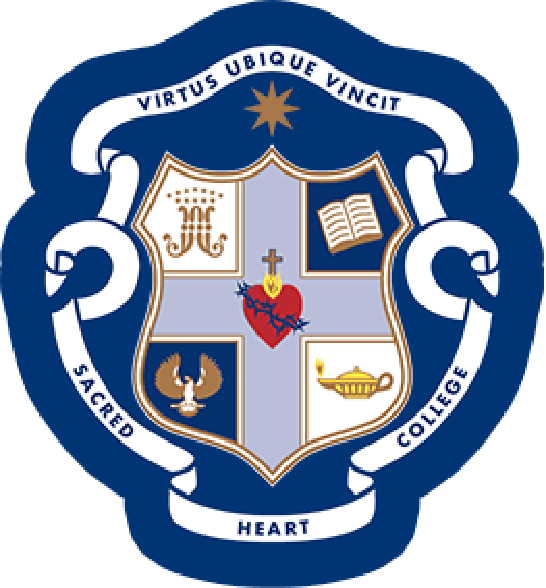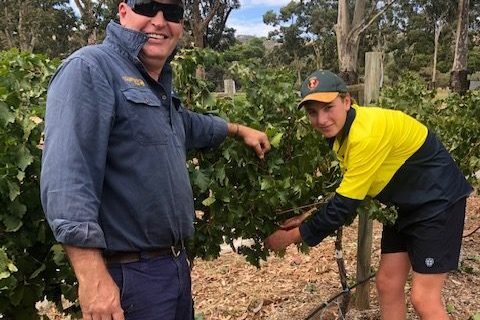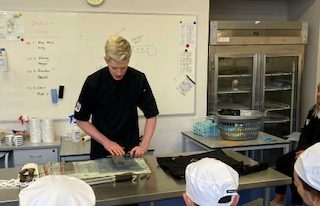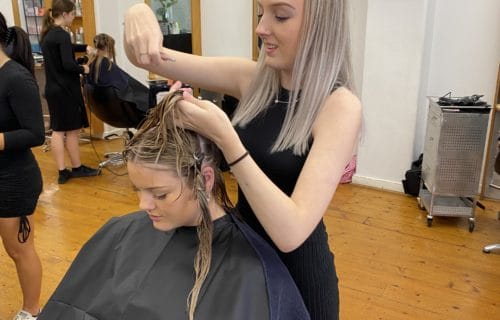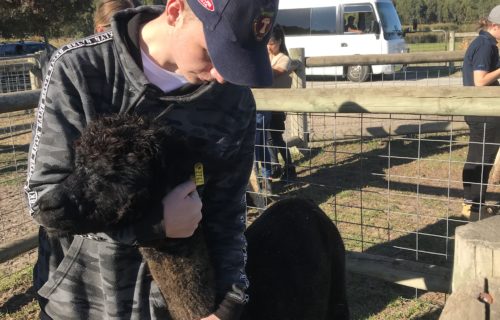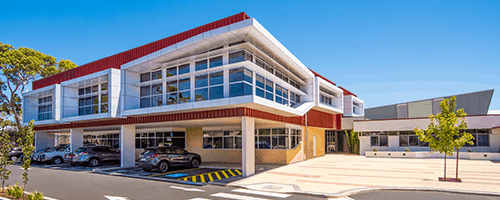
To our Sacred Heart Community
Student Story
Cameron Lockwood (OS ’19)
Wolfmother released their sixth album, Rock Out and the anthology was recorded, mixed and mastered by 20 year old Cameron Lockwood (SAE audio student). Cameron shared how he was given the opportunity, and Wolfmother’s Andrew Stockdale reveals why he wanted a young audio engineer to work on the project.
Cameron, who’s studying a Bachelor of Audio at SAE Byron Bay, relocated to the region from Brighton South Australia after receiving a Destination Australia Scholarship. He decided to study through SAE whilst at school.
SAE have been a long term participant in our annual Careers Expo.
The connection with the band started out in 2020 when Cameron introduced himself to Wolfmother’s front man, Andrew Stockdale at his solo gig at Reasonater Music in Ballina, Northern NSW.
“After talking to Andrew at Reasonater at the beginning of this year, I approached him again at a café in Byron when he was having breakfast, and he said he was looking to record some new stuff.”
“I said I was an audio engineer, and was willing to work for free to learn from him. I gave him my number, and he contacted me and said he would pay me, even though I was only a student that’s still learning their trade.”
“I’m really grateful for the opportunity Andrew gave me. A lot of other people my age can only dream of working with a band of the calibre of Wolfmother.”
Cameron would later meet Andrew at a recording studio at his house where they would begin re-recording existing demos for Rock Out.
“We started with the drums, and at that stage I probably didn’t realise he was going to use if for the final cut of the album.”
Wolfmother’s front man, Andrew Stockdale revealed why he was interested in getting Cameron to work on the album.
“The younger generation now are a lot quicker to get things done. With Cameron, he was able to mix and master the album in a short period of time, which was really beneficial for us so we could get the album out there.
“I was in touch with a few labels that were interested in releasing it, but in the end I decided to use a digital aggregator. I think that’s more powerful as you can regularly share music, without needing a big setup.”
SAE Chair for Audio, Gareth Parton congratulated Cameron on the opportunity to learn and work with Wolfmother.
“It’s excellent to see one of our students getting the chance to work with such an iconic Australian band. SAE is proud to produce another industry practitioner, using the recording, mixing and mastering skills they learnt studying for their Bachelor of Audio degree.”
Find out about studying at SAE.
(Article taken from SAE webpage)
Work Experience for 2022
BEFORE CONSIDERING WORK EXPERIENCE PLEASE BE AWARE OF THE FOLLOWING:
It is a legal requirement that prior to commencing Work Experience students are inducted in the following areas: Work Health and Safety Act 2012 SA, Children and Young People (Safety) Act 2017 SA, Sex Discrimination Act 1984 SA, Equal Opportunity Act 1984 SA and Child Safety (Prohibited Persons) Act 2016 SA. Adequate time (approximately 5 hours) should be allocated to cover these topics effectively and students need to demonstrate their understanding. This induction is done by the school and is consistent with our Duty of Care to ensure that no student is placed where they may not be safe physically or psychologically.
In addition to this, the Work Experience form must be signed by the student, work placement provider, parent/guardian (all arranged by the student) and finally the principal or delegate (arranged by the school). The original Work Experience Agreement form then becomes a legal contract which sets the school insurance cover in place and must be retained by the school.
The school must also provide a contact person who is responsible for each student for the duration of their placement.
Work Experience is a very valuable opportunity for most students however, it does take time to ensure that the above expectations are met. We are happy to accommodate students in the times allocated. Please do not cause yourself or the College embarrassment by making other arrangements and then asking for exceptions to be made.
Students who wish to do Work Experience during 2022 are advised that the dates are:
| Work Experience Weeks | Paperwork Deadline |
| 4 – 8 July (Year 10 and 11’s) | 3 June |
| 11 – 15 July | 3 June |
| 10 – 14 October | 2 September |
| 21 – 25 November (Optional Work Experience for Year 12’s Only) | 21 October |
| 5 – 9 December | 4 November |
Work or job trials are not sanctioned by SA Work Experience guidelines.
Please note this is general Work Experience only. Students undertaking a VET program will need to organise their VET work placement with the VET Office.
Key Dates
-
The Defence Work Experience Program has commenced for 2022
There are a range of work experience opportunities for students advertised on the Defence Work Experience Program website.
These include the following dates which would work for interested SHC students:
12th -13th May, Army Familiarisation – Keswick Barracks Week 2 Term 2
23rd -26th May, Air Force Familiarisation – RAAF Edinburgh Week 4 Term 2
28th -29th July, Army Familiarisation – Keswick Barracks Week 1 Term 3
19th -22nd Sep, Air Force Familiarisation – RAAF Edinburgh Week 9 Term 3 (The timing of this week is not appropriate for Year 12 students)
27th -29th Oct, Army Familiarisation – Keswick Barracks Week 2 Term 4 (This week would mean that Year 12 students would miss their final day of school, Graduation Assembly etc.)
Students need to be at least 15 years old to participate and must be able to get to the location as public transport options to Edinburgh are extremely limited. Further information about the program can be found at Home: Defence Work Experience Program: Department of Defence Any student intending to apply for a week’s placement need to register in the careers office please.
-
Academy of Interactive Entertainment (AIE) Information Evening
Thursday 17th March 6:00 – 8:00 pm
Adelaide and Online
Discover the courses designed to get you started in game development, film, 3D animation and visual effects at the AIE Information Evening. The evening will include presentations on different areas of industry to get into as well as information about AIE full-time and part-time courses and entry requirements. AIE will be showing off AIE student work and their staff and teachers will be available to chat with you about courses and how AIE can get you into a creative career.
Find out more here
-
Australian Institute of Fitness (AIF) Open Day
Saturday 26th March 10:00 am – 12:00 noon
Open Day your chance to go on campus and get a taste of what it’s like to study at the Australian Institute of Fitness. Learn about a range of industry-leading courses, along with your career options in the fitness and massage industry, as you chat to the Careers team and staff. You will also have the opportunity to tour the state-of-the-art training facilities.
Find out more here
-
UniSA Women in Astronomy
Saturday 23rd April 7:30 – 9:30 pm
Adelaide Planetarium, Mawson Lakes
Women have been leaders in the science of astronomy, many of them pivotal and pioneering in their field. Join UniSA at the Adelaide Planetarium for this presentation and tribute to the incredible women in astronomy, both past and present.
Find out more here
-
Tertiary Studies and Careers Expo
Sunday 10th April 10:00 am – 4.00 pm and Monday 11th April 9.30 am – 2:30 pm
Adelaide Convention Centre
Get expert advice at the Tertiary Studies and Careers Expo, Adelaide (TSCEA) incorporating the South Australia Work and Skills Expo for your transition from education to employment.
TSCEA provides a fantastic opportunity to find all of the information you need to kick start or redirect your career and find information all under the one roof!
TSCEA is suitable for a range of visitors including:
- High school students and their parents,
- Mature age and post graduate students,
- Career seekers of ALL ages,
- Employers looking for staff training.
Find out more here
-
Adelaide Careers and Employment Expo
Friday 6th and Saturday 7th May 9.00 am – 5:00 pm
Adelaide Showground
SA’s largest Careers and Employment Event is open on May 6th and 7th.
The Expo will host over 100 organisations and employers with career opportunities for all ages.
The event is for school students, parents, teachers, graduates, job seekers, people looking for courses and workers seeking new training options.
The Expo is packed with free advice, you can…
- Talk with over 100 training organisations and employers
- Gain Free Career advice
- Experience the daily Career Seminars
- Learn how to write a winning resume
- Try a trade at the Interactive Zones
- Talk with employers at the New Automotive Huband New Construction Hub
- Discover what jobs are available in the Defence Industry
- Find your ideal role at the Australian Defence Force Display
If you are looking for a job, career change, courses or you are a school student looking for a career path, you can’t afford to miss this event.
Find out more here
Vocational Education and Training
Our 2022 VET students have commenced their courses in Term 1 with a staggered start. For some students it was business as usual, for others it was either online learning or a delayed start until 14th February.
All courses are well underway now with over 135 students undertaking a wide range of experiences in various VET areas of study. The Cert II Construction pathways continues to be the most popular choice followed very closely by Cert III Entrepreneurship and New Business which is hosted on campus at Sacred Heart College.
Here is a sample of what other VET courses students are enrolled in this year;
- Introduction to Welding
- Cert II Automotive
- Cert III Early Childhood Education and Care
- Cert III Health Services Assistant
- Cert II Hospitality
- Cert II Plumbing
- Cert III Rural Operations
If you have any questions regarding VET, please don’t hesitate to contact Sarah Benedictson, VET Coordiantor via vet@shc.sa.edu.
Tertiary Information
Flinders University Offer
Monthly free public lectures which showcase the world-leading research being undertaken at Flinders on relevant issues faced by communities, the environment, nation-states and global economies. Learn more here. If you would like to find out more about the work of Flinders University, or are interested in connecting with any one of the researchers, then visit braveminds or engage.
How and why you might need to register for the SAT
Australian students who’d like to apply to study at universities overseas may well need to complete a SAT exam as part of the application process. The SAT is a standardised, multiple-choice, pencil-and-paper entrance exam that’s widely used for college admissions in the United States (and some other countries). You can read more about the SAT and what’s involved from the following links:
- https://satsuite.collegeboard.org/sat/registration/international-testing
- https://www.crimsoneducation.org/au/blog/test-prep/how-to-register-for-SAT-internationally/
You’ll also have to pay a fee, you can check how much it costs here.
UCAT ANZ for Medicine and Dentistry in 2023
The University Clinical Aptitude Test is a compulsory test that you may have to sit in order to apply for some degrees in the fields of Medicine or Dentistry. It is designed to help universities select applicants with the appropriate abilities and professional behaviours required to practice successfully as doctors or dentists. It is used in collaboration with other admissions processes, such as interviews and academic qualifications.
13 of the universities in Australia offering Medicine and Dentistry, and 2 in New Zealand, will require you to sit the UCAT ANZ test as part of your application. So, if you’re thinking of applying to uni in 2023 for a degree in one of those fields, you should check the entry requirements as soon as possible to find out if taking the UCAT ANZ is necessary.
Registrations for concession and access schemes are open now. Bookings open on 1st March 2022 and close on 17th May. You’ll sit the tests between 1st July and 12th August 2022. Results will be delivered to the universities in early September.
It costs $305 to sit the test ($199 concession fee, but you only have until 10th May to register for concession prices). Additional information about dates, fees and how to register can be found here. To find out which universities and courses apply, the eligibility criteria, or simply to find out more, head over to the official UCAT ANZ website.
Spotlight on Careers
How to become an Aircraft Pilot
Soar the skies
-
What do Aircraft Pilots do?
Aircraft Pilots operate planes in order to transport passengers and goods from one location to their destination. They may also provide agricultural, aerial surveillance, or other aviation services.
If you are hardworking and confident, are willing to work long hours away from home, and want a job that can take you anywhere in the world, becoming an Aircraft Pilot could be ideal for you.
About you:
- Trustworthy and reliable
- Confident with a steady hand
- Excellent communicator
- Analytical and thorough
- Alert and quick-thinking
- Works well under pressure
- Good problem-solver
- Patient and thorough
The job:
- Preparing flight plans before take-off
- Considering weather conditions and other factors
- Completing comprehensive system checks before take-off
- Operating a variety of aircraft and associated technology
- Communicating with other staff on the ground and on board
- Monitoring aircraft performance and safety
- Taking important directions from air traffic control
-
How to become an Aircraft Pilot in Australia
You will need to complete a combination of both practical and theoretical assessment in order to become a qualified Aircraft Pilot in Australia.
Step 1 – Complete Year 12 with a strong focus on English, Maths and Sciences.
Step 2 – Start your flight training, either through a private flying school, or in combination with a VET or university degree.
Step 3 – Obtain your recreational or private pilot license.
Step 4 – Obtain an aviation reference number (ARN) from the Civil Aviation Safety Authority (CASA).
Step 5 – Gain extensive experience and pass further examinations to obtain a commercial pilot license. You may also need to complete further training in order to operate specific types of aircraft.
Find out more here –
-
Similar Careers to Aircraft Pilot
- Helicopter Pilot
- Logistics Manager
- Air Traffic Controller
- Flight Attendant
-
What are three things I can do right now to help me become an Aircraft Pilot?
If you’re in high school and you’d like to find out if a career as an Aircraft Pilot is right for you, here’s a few things you could do right now:
- See if you can try out a flight simulator, get work experience in aviation, or even talk to a current pilot to see what a day in the life is like.
- Volunteer in your community or find a casual job to start building valuable skills, as well as it looking great on any future job and study applications.
- Start researching your options when it comes to flying schools and course options.
-
Hartwig Air
Hartwig Air has been established for more than 50 years. Their flying instructors are all experienced Flight Instructors providing ‘real training in the real world’. For example, Private Pilot training includes flights to experience both busy traffic and extreme remote area flying, using a varied and modern training fleet. They have working opportunities that can be applied for by studying students.
Courses on offer are:
- AD023HA – Associate Degree in Aviation (Professional Pilots)
- AVI50219 – Diploma of Aviation (Commercial Pilot Licence – Aeroplane)
Hartwig Air are currently conducting an Open Day every 3rd Saturday of the month at their Parafield Airport School from 10.00 am to 4.00 pm.
Interesting Stuff
Are you a Critical thinker?
Lots of careers list critical thinking as a core skill that’s required in order to be successful. Find out if you are a critical thinker, get examples of why you might need this skill in the workplace and get tips on how to develop your critical thinking skills.
What does Critical Thinking actually mean?
Essentially, it’s the skills where you:
- learn to recognise or develop an argument
- use evidence to support your argument
- draw reasoned conclusions, and
- put your knowledge to use by using that information to solve problems
Why critical thinking in the workplace is important
Critical thinkers in the workplace are more likely to understand the meaning behind their role, which increases the chances of them engaging with the work. Employers want job candidates who can evaluate a situation using logical thought and offer the best solution.
Plus, critical thinkers can reduce wastage and increase productivity through analysing processes and identifying areas for improvement, be trusted to make decisions independently, and won’t need constant handholding.
Examples of jobs that require critical thinking:
- Nurses working in Emergency triage need to assess the cases waiting to be seen and decide who needs to be treated first
- Criminologists are required to do a lot of research and critical thinking to solve crimes
- Plumbers called to a job need to evaluate what action needs to be taken (and the order work needs to be done) then decide on the best materials to do the job.
- Lawyers review evidence, quickly refer to past rulings and laws to come up with strategies to win a case or get the best outcome for their clients
- Logistics Managers dealing with large quantities of goods and complex supply chains requires strong critical thinking skills
- Accountants clients will appreciate your critical thinking skills when you help and direct them use their money productively
- Managers need to find ways to obtain customer feedback, review it and use the information to make changes or improve on their service, products and staff performance to increase the sales
- Software Developers need critical thinking to design today’s complex but efficient code – making things easier for people who use them
- Doctors need to use critical thinking skills as patients often present with complex symptoms and issues, you’ll have to come up with appropriate solutions and make sure you’re providing the best possible care
- Safety is incredibly important, so being able to think critically and identify any problems is crucial for WH&S Officers.
Develop your critical thinking skills
Practise the steps of critical thinking by applying them in as many situations as you can:
- Pinpoint the issue – what is the problem that needs solving or the question that needs answering
- Collect information – do some research and collect data, be sure to include sources that challenge your own opinions
- Scrutinise the evidence – is your data from a reliable source, is it biased, is there hard evidence
- Decide what’s relevant – reject any dodgy information, then make sure everything that’s left is actually relevant to the original issue
- Self-evaluate – have you approached this exercise with an open mind, willing to learn, done enough research?
- Conclude – based on your work, create a couple of conclusions. Then assess each one for weaknesses, validity and decide which one is the most sound
- Share your ideas – communicating your findings to other people is the last but really important part of critical thinking. If you can’t effectively share your thinking or solutions, then you may have wasted your time.
Improving on these skills could help you to become a better critical thinker:
- Observation – take notice of what’s going on around you, it could help you to see opportunities and problems as well as help you to come up with solutions
- Analysis – this could help you to gather the right information, understand it and draw useful information from it
- Inference – use relevant data and personal experience to draw valid conclusions
- Communication – active listening, teamwork and collaboration, presentations, working on your verbal and written work will all ensure that you’re learning and sharing the right information in the best way
- Problem solving – learn to identify problems, find solutions and then, importantly, assess whether the solution is working or not
- Objectivity – this skill will allow you to really ‘see’ the information in front of you rather than working from assumptions or your own personal bias. Get outside your comfort zone, be inclusive, and saying yes to a variety of opportunities could really help you to learn how to be more objective.
What makes you happy?
A big part of our lives is the things that make us happy. If we didn’t have things we enjoy, life would be pretty boring, right? So it makes sense that we want our future goals and career to align in some way with the things that make us happy. Thinking about the things that make us happy is an exercise in gratitude – we should be thankful for the good things in our life. If you don’t think about the things that make you happy, you might be taking them for granted. Taking some time to reflect on the things that make us happy can be a really helpful thing to do (as well as just being a nice thing to do).
Taking some time to reflect
Think about the last few weeks. What has made you happy over that time? It could be an activity you did, a person you spent time with, a place you visited – whatever it was, if it made you happy, write it down.
Here are some examples to get you thinking:
- Pets and animals
- Friends
- Family
- Sport
- Music
- Sleep
- Video games
- Being outdoors
- Money or work
- Cooking
- Community/culture
- Reading
- Technology
- The list is nearly endless!
Prioritising your happiness
Now that you’ve thought about the things that make you happy, start thinking about your future. How might you be able to incorporate these things into your future career or life? For example, if music is something that makes you really happy, you might want a career that incorporates music somehow.
Enjoy!
It’s not just about the future – having activities and things in your life right now that are fun and fulfilling are so important. Having a good balance between doing the things you love and the things you need to do is key. It’s important to remember that the things we like make up a part of who we are!
It’s also important to remember that an activity doesn’t need to be making you money for it to be worth doing. You might like to learn an instrument or teach yourself to code just for fun, even if you never want a career in music or IT – as long as you enjoy it, it was worthwhile.
Disclaimer: Statements on careers and courses included in this newsletter are not necessarily those of Sacred Heart College. i.e. The text of notices on courses and industry prospects may be taken directly from their correspondence/publicity material. Some material taken from Study Work Grow (South Australia Careers News).


